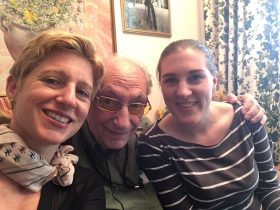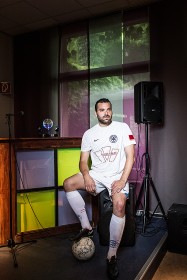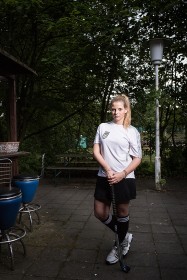The first entry in the series “Memories from the Life of Walter Frankenstein”

Walter Frankenstein with Anna Rosemann and Theresia Ziehe in Stockholm, 2017, Photo: Theresia Ziehe
I first had the pleasure of meeting Walter and Leonie Frankenstein in Stockholm in 2008. Back then, our meeting and the couple’s heartfelt partnership left a lasting impression on me. After 66 years of marriage, the Frankensteins still radiated love and a deeply held respect for each other. The author Klaus Hillenbrand, who tells the Frankenstein’s life story in Nicht mit uns (Not with Us), sums up this impression at the end of his book with a question he asks the couple: “Does ideal love exist?” Leonie looks at Walter. And Walter looks at Leonie. And then they give the shortest possible answer, as if speaking from one mouth: “Yes!”
→ continue reading
The 14th European Maccabi Games (EMG) are taking place in Berlin from 27 July until 5 August 2015. More than 2,000 Jewish athletes from 36 countries will compete in 19 sports from football to fencing to chess. To accompany the games Tamar Lewinsky and Theresia Ziehe are producing a series of portraits with interviews, introducing a new member of the German delegation from Berlin every day here on the blog. They conducted the interviews on the grounds of the TuS Maccabi in Berlin’s Grunewald where Stephan Pramme also shot the portraits.
Ben Lesegeld (28), soccer
Ben, what role does it play for you that a part of the European Maccabi Games will be held at Berlin’s 1936 Olympic park?

Ben (28) soccer © Jewish Museum Berlin, photo: Stephan Pramme
On the one hand, it’s very special for me as an athlete, because the Olympic compound offers us a completely professional setting. On the other hand, it gives me a queasy feeling. The architecture of the Olympic Stadium always leaves me a little bit awestruck. For me, it’s not simply a “wonderful setting” though, because the stadium always reminds one of the history. So it’s not that simple to participate in an athletic event there with ease, joy, and pleasure. For me personally, it’s important to think about the people who weren’t allowed to take part back then. But I still find it good that the Maccabi Games are happening there. It shows that life must go on: we know exactly what happened there, but we keep going, we take part in a sporting event – despite this history – and we show that the future will be an open one.
What requirements must one fulfill – aside from athletics – in order to participate? → continue reading
The 14th European Maccabi Games (EMG) are taking place in Berlin from 27 July until 5 August 2015. More than 2,000 Jewish athletes from 36 countries will compete in 19 sports from football to fencing to chess. To accompany the games Tamar Lewinsky and Theresia Ziehe are producing a series of portraits with interviews, introducing a new member of the German delegation from Berlin every day here on the blog. They conducted the interviews on the grounds of the TuS Maccabi in Berlin’s Grunewald where Stephan Pramme also shot the portraits.
Sarah Geldmann (25), Hockey

Sarah (25) hockey © Jewish Museum Berlin, photo: Stephan Pramme
Sarah, what meaning does it hold for you that the European Maccabi Games are taking place in Berlin?
The symbolism is intense, I think. We represent Jewish life in Germany, and, as hosts, we can show other nations that there aren’t just a few of us in Germany, as some may think. There is Jewish life here, and Berlin has become a hotspot for Israelis. Even if some had concerns, it’ll for sure be a great event.
Jewish athletes were barred from the 1936 Olympics. Now this is exactly where most of the European Maccabi Games are taking place. What do you think about that?
Of course, it has a huge historical meaning. There are survivors who are with us, and I’m proud we can show them we’re here again. → continue reading


